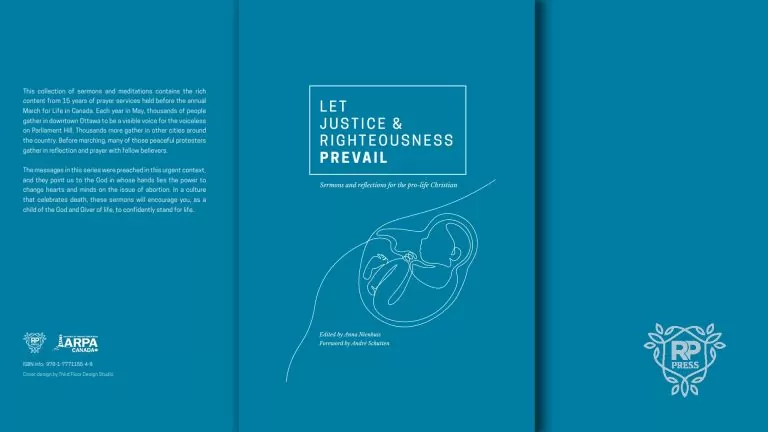The following speech, titled “Suffering, selfishness, and sacrifice,” was delivered by Pastor Winston Bosch at a pro-life prayer service before the 2020 March for Life in Ottawa. After sponsoring such services for 15 years, ARPA Canada had a collection of great content, and teamed up with RP Press to publish 20 of these speeches in a book. ARPA staff have been working through Let Justice and Righteousness Prevail: Sermons and reflections for the pro-life Christian during their weekly devotions, and our hope is that you can be blessed by the book too. You can order it at Press.ReformedPerspective.ca.
*****
As we consider the topic of abortion, my mind goes to the prayer of Solomon in 1 Kings 3:1-28. In this chapter, the Lord God asks Solomon what he would like the Lord to give him and Solomon prays this prayer:
“Give your servant an understanding mind to govern your people, that I may discern between good and evil.”
That’s a beautiful prayer, and isn’t that also a prayer we should pray for our own government? Our sincere prayer should be that God would give our government an understanding mind to govern the people of this land, that the Lord would give the government discernment between good and evil, also in terms of life and death, of life and abortion.
The author of 1 Kings 3 notes this prayer of Solomon, and then goes through the legal records of his day and finds evidence of how the Lord answered Solomon’s prayer. That legal courtroom transcript is found in 1 Kings 3:16-28.
Then two prostitutes came to the king and stood before him. The one woman said, “Oh, my lord, this woman and I live in the same house, and I gave birth to a child while she was in the house. Then on the third day after I gave birth, this woman also gave birth. And we were alone. There was no one else with us in the house; only we two were in the house. And this woman’s son died in the night, because she lay on him. And she arose at midnight and took my son from beside me, while your servant slept, and laid him at her breast, and laid her dead son at my breast. When I rose in the morning to nurse my child, behold, he was dead. But when I looked at him closely in the morning, behold, he was not the child that I had borne.” But the other woman said, “No, the living child is mine, and the dead child is yours.” The first said, “No, the dead child is yours, and the living child is mine.” Thus they spoke before the king.
Then the king said, “The one says, ‘This is my son that is alive, and your son is dead’; and the other says, ‘No; but your son is dead, and my son is the living one.’” And the king said, “Bring me a sword.” So a sword was brought before the king. And the king said, “Divide the living child in two, and give half to the one and half to the other.” Then the woman whose son was alive said to the king, because her heart yearned for her son, “Oh, my lord, give her the living child, and by no means put him to death.” But the other said, “He shall be neither mine nor yours; divide him.” Then the king answered and said, “Give the living child to the first woman, and by no means put him to death; she is his mother.” And all Israel heard of the judgment that the king had rendered, and they stood in awe of the king, because they perceived that the wisdom of God was in him to do justice.
This example is undoubtedly one of many that could have been chosen, and it vividly illustrates how the Lord gave Solomon the gift of great wisdom, an understanding mind to govern, and discernment between good and evil, right and wrong.
This is a passage of Scripture that the author has recorded under the inspiration of the Holy Spirit. What I’d like to do is take this story and use it as a springboard for prayer to help us pray concerning abortion in the country of Canada.
Suffering
The first thing that I would like to note from this story is the existence of both suffering and selfishness. The passage starts, “Then two prostitutes came.” When you hear the word “prostitute,” the first thing that should come to your mind is suffering.
Prostitution is violence against women. Prostitution is intrinsically exploitative and anti-women. Research has shown that 90% of women involved in prostitution would like to escape it, but can’t figure out a way to do so and still survive. So, when we read “two prostitutes” we ought to think of suffering. These women suffer at the hands of men, and here they both become pregnant – and the fathers are, of course, nowhere to be seen. They’re pregnant and alone.
I think that suffering is a good place to start as we think about what to pray when we pray that abortion might end in Canada. It helps us to think of the suffering that many women undergo at the hands of men. Many women are impregnated by men who do not want to take responsibility for children. Some women are pressured into abortions, or abused or abandoned by men. There is so much suffering behind abortion. Women feel like they have no choice, no other option, like they’re being forced down a road that ends at an abortion clinic.
Once there, women are suffering at the hands of a big abortion industry that is, at its very heart, anti-women. The abortion industry tells women that being a mom is a weakness, and that killing your baby is a strength. It is an industry that profits off of suffering. Abortion doesn’t help women out of the surrounding problems of their life. Abortion doesn’t help women to leave abuse. Abortion doesn’t help women with the financial insecurity they experience, or their general feeling of being unsupported. What abortion does is get men off the hook while making women suffer the physical, the mental, the emotional scars that abortion often leaves in its wake.
As we pray, we who are pro-life must remember and pray for women that are suffering. Women that feel trapped. Women that feel like they have nowhere to go, that they’re pressured on all sides, that they’ve been abandoned by men, that can see no way forward with a baby. Women that are suffering and about to abort their baby.
Selfishness
But as we read this story, we move quickly from suffering to selfishness. This selfishness is represented in the story of the second woman. She awakes in the night and finds that she has accidentally smothered her baby. She takes the limp, dead child, sneaks into her housemate’s room, and exchanges her dead baby for the live baby.
While there is certainly sadness and suffering here, it results in a horrific sin of selfishness: a cruel act of kidnapping, a lie, the stealing of the joy of motherhood from another and giving the devastation of infant death. And then the horror of her selfishness takes on a new depth when she is confronted by the king. The selfish act that she committed against another woman now becomes a selfish murderous act committed against a baby.
You can see the scene: the soldier holds the living baby, brandishing a sword as the wise king seeks to discern between good and evil, and evil shows its face. Selfishness shows its face. And in its ugliness, it hisses from the lips of the second woman, “He shall be neither mine nor yours. Divide him! Cut him in two!”
This is where the sin of selfishness leads us, doesn’t it? It leads us also today to men and women so consumed by their own agenda, men and women so consumed by their own plans, men and women so insistent that nothing will defy their will, that nothing will stand between them and their desires, their wants, their plans, their comfort, their convenience, that they’re willing to say, “This living baby shall be neither mine nor yours. Cut him in two.” It’s a horrific and realistic picture of the selfish horror inherent in abortion. “My plans come first. My life comes first. My desires must be first. Cut him in two. Rip her apart with a vacuum suction device. Use a clamp to dismember him, cut her into pieces. Remove this child from my womb, for this baby shall be neither mine nor yours.”
We rightly shed compassionate tears and say compassionate prayers for the many women that are suffering as a result of abortion and its impacts. But we must also be willing to speak truth and to pray truth against the selfishness of men and women who leave a wake of dead babies behind them. “He shall be neither mine nor yours. Cut him in two.”¹ Pray for the suffering, and for the selfish, that they might see a Saviour and turn to Him.
Sacrifice
This text speaks of suffering and selfishness, and we see those all around us – and inside of ourselves – in the world in which we live. But now we move from suffering and selfishness to sacrifice. We see this in verse 26:
“Then the woman whose son was alive said to the king, because her heart yearned for her son, ‘O my lord, give her the living child and by no means put him to death!’”
This prostitute whose child was alive, this woman’s heart understood that love and life are bound tightly together. This woman knew that children ought to be yearned for, and protected. This woman teaches us something about the sanctity of life and about the sacrifices to be made to keep babies alive. “Give this living child to another woman! Don’t allow this child to die.” From this prostitute, this suffering woman, we hear no selfish talk come from her mouth. There’s no reasoning that, “Well, this child can live if it suits me. The child can live, but on my conditions.” There’s none of this talk that, “The child can live if I can provide them a good home,” or “The child can live only if I can be the mother that I want to be.”
Instead, selfishness is replaced by sacrifice. “Lord, King, give the child to another woman if it will save a life. Give my child to my lying brothel roommate. Let her adopt him, only let the child live!” Only let the child live. This woman is willing to sacrifice her right of motherhood, her right of parenthood, if only the child can live. This is love for life.
Pray that the Lord would teach us sacrifice, that we would want to learn from the good prostitute. There’s so much suffering in this world. There’s so much sin and selfishness in this world. But when it comes to the sanctity of life, when it comes to the life of little unborn children, it’s sacrifice that must win over sin and suffering. Is that not the Jesus way? That is the example that our Lord Jesus Christ set for us at great cost – suffering is won over and sin is beaten by sacrifice. So, as believers who treasure the sanctity of God-created life, it’s important for us to realize that when we speak about the sanctity of life, sacrifice is needed to overcome the suffering and sin that lead to abortion.
It’s easy to say that it’s the pregnant moms, the distressed dating couples, or the overwhelmed parents who don’t want another child that must sacrifice their selfish dreams in order to save a child. And that’s true, of course. But it’s also you and me, we who live in the shadow of the cross of Jesus, who must be ready to sacrifice. We must be ready to sacrifice our time, and our money, and our reputations, and our plans, and our comfort for the sake of the unborn. The sin of abortion must be met by the church’s willingness to sacrifice. The suffering and the sin of abortion must be met by the sacrifice of adoption and fostering, and homes and churches that provide safe places for pregnant women to have their children. Our cry must be, “Lord, I’m willing to take up my cross and I’m willing to open my home and I’m willing to extend my table if only you let the children live! If only the child will live.”
Governance and God
This gripping story in 1 Kings 3 ends beautifully with these words in verse 27: “Then the King answered and said, ‘Give the living child to the first woman and by no means put him to death. She is his mother.’” Solomon recognizes that the essence of motherhood is unselfish, sacrificial love. In awarding the baby to the woman willing to sacrifice her interest for the baby’s welfare, Solomon embraces the sanctity of life over self.
And so, we pray that we might see in our day an understanding mind and a discernment between good and evil in our government. And we can pray for the same wisdom and discernment for ourselves. We have seen that this is a prayer that the Lord delights to answer.
We pray that our government would be willing to help the suffering, but not indulge the selfish. We pray that our government would recognize the sanctity of life and not support the termination of life. We pray that they would support and encourage sacrifice, not sin.
In 1 Kings 3 we have a court record, a legal record concerning a child in danger, a child whom one woman is willing to have cut in two. The court record ends with the king’s wise ruling, “By no means put him to death!” That is what we pray for when we pray to end abortion – that we would hear those words from our government: “By no means put the unborn to death!” We pray that we might one day hear and have written before us a legal record, an official proclamation of Parliament stating, “We recognize the pre-born child as a human being and we have amended the Criminal Code to say abortion is illegal. By no means put the children to death!” That is our prayer, a prayer for God to move in a way that only He can.
Until the Lord answers our prayer as He answered Solomon’s prayer, we continue to give our lives as living sacrifices so that, in this world of suffering and selfishness, the sanctity of life might not be ignored. Because this, brothers and sisters, is the Jesus way.
It was Jesus who, in Matthew 12, said that He was greater than Solomon. The great messianic king came to earth as an unborn child in His mother’s womb. Jesus, who came to this earth to suffer. Jesus, who loved and befriended and ate meals with and taught prostitutes as His own disciples. Jesus, who denounced selfishness with His sacrificial love on the cross. Jesus, who maintained the sanctity of life against murder and yet willingly gave Himself up to be murdered, nailed to a cross. Jesus, who rose again to sit on the throne as the greater Solomon, where He sits today, that we might all be in awe of the king, perceiving in Him the wisdom of God to do justice. Jesus, who knows the plight of every aborted child. Jesus, who will judge with justice. Jesus, who governs from heaven today with goodness and grace.
And Jesus, who one day will return to demonstrate conclusively that, through sacrifice, sin and suffering will be no more. Jesus, who one day will issue the order, “By no means put those children to death.” Our Lord Jesus Christ is our guarantee that one day all abortion will come to an end.
Prayer points
- Pray for those who are suffering and feeling trapped in difficult circumstances, especially women facing an unplanned and unwanted pregnancy
- Thank God for His example of great sacrifice, and pray for His strength to live a sacrificial life in His service
- Pray for the blessing of courage to defend and support life
- Pray that God would give you words to speak with grace and truth, that others would be called to true repentance from selfishness and so bring glory to God
Discussion questions
- Read 1 Peter 2:1-25, and consider verse 21 in this context. To what have we been called, and how does that impact how we use our voice in the public square?
- The theme of sacrifice runs throughout scripture. Meditate on what Christ was willing to sacrifice in order to save us from our condemnation. Think of other Biblical examples where selfishness was overcome by sacrifice.
- Consider everything we are asked to be willing to sacrifice in order to let the children live – home, time, privacy, money, reputation, comfort, etc. Which of these are you most resistant to sacrificing when you consider how you could be involved in pro-life action?
- Many today are focused on self, and what they get out of their relationships. How has this attitude impacted us as Christians in relationships? How can you practice love that puts sacrifice before selfishness in your own life, for example as a friend, co-worker, client, sibling, parent, or spouse?
Endnote
¹ In 1989, there was a case where this played out in our modern courts. In Tremblay v. Daigle, the couple had ended their brief relationship when Ms. Daigle was 18 weeks pregnant. She decided to abort the child. Tremblay, the child’s father, wanted to keep the baby and tried to prevent her from having an abortion. A court initially granted an injunction to stop the abortion, but this was overturned by a higher court in favor of Ms. Daigle, saying the court could not permit a man to veto a woman’s choice. Ms. Daigle who went ahead with the abortion, essentially saying, “This baby shall be neither mine nor yours. Cut him in two.”















